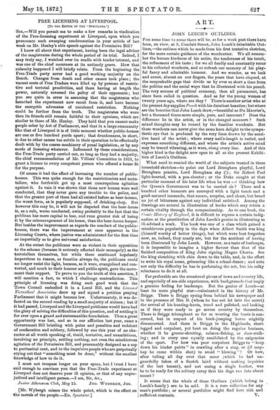FREE LICENSING AT LIVERPOOL
[TO THE EDITOR OF THE "SPECTATOR.")
you permit me to make a few remarks in vindication of the Free-licensing experiment at Liverpool, upon which you pronounce such sweeping condemnation in your article of last week on Mr. Henley's able speech against the Permissive Bill?
I know all about that experiment, having been the legal adviser ,of the magistrates during the whole period of its trial. Indeed, I may truly say, I watched over its cradle with tender interest, and was one of the chief mourners at its untimely grave. How that -calamity happened I will briefly relate. From the beginning the Free-Trade party never had a good working majority on the Bench. Changes from death and other causes took place ; the vacant seats of Free Traders were filled up by persona of restric- tive and teetotal proclivities, and these having at length the power, naturally reversed the policy of their opponents ; but you are quite in error in assuming that the magistrates who -launched the experiment now recoil from it, and have become the energetic advocates of nnrelaxed restriction. Nothing could be further from the truth. The magistrates who were then its friends still remain faithful to their opinions, which are .similar to those of Mr. Henley. They hold that you cannot make people sober by Act of Parliament, and that in a large community like that of Liverpool it is of little moment whether public-houses are one or five hundred yards apart ; that drunkenness, in short, is due to other causes too subtle in their operation to be effectually -dealt with by the coarse machinery of penal legislation, or by any mode of licensing whatever. Influenced by these considerations, the Free-Trade party carried out, as long as they had a majority, the chief recommendation of Mr. Villiers' Committee in 1853, to -grant a licence to every competent person who offered a house fit for the purpose.
Of course it had the effect of increasing the number of public- 'houses. This was quite enough for the restrictionists and teeto- tallers, who forthwith got up a most unscrupulous agitation against it. In vain it was shown that these new houses were well conducted, that they never gave any trouble to the police, and that the greater part of them had all existed before as beer-houses, the worst form, as is popularly supposed, of drinking-shop. But however this may be, it will not be disputed that the beer-house is, as a rule, worse conducted, owing probably to the fact that the publican has more capital to lose, and runs greater risk of losing it by the mismanagement of his house, than the beer-house keeper. But besides the improvement as regards the conduct of the public- 'houses, there was the improvement at once apparent in the Licensing Courts, where justice was administered for the first time -SO impartially as to give universal satisfaction.
At the outset the publicans were as violent in their opposition to the scheme (because it seriously affected their monopoly) as the teetotallers themselves, but while these continued hopelessly impervious to reason, as fanatics always do, the publicans could no longer resist the light, became, as it were, evangelised and con- verted, and much to their honour and public spirit, gave the move- ment their support. To prove to you the truth of this assertion, I will mention a fact, to which I challenge contradiction. This principle of licensing was doing such good work that the 'Town Council embodied it in a Local Bill, and the Licensed Victuallers' Association drew up and signed a petition praying Parliament that it might become law. Unfortunately, it was de- feated on the second reading by a small majority of sixteen ; but if it had passed, Liverpool and the Liverpool publicans would have had the glory of solving the difficulties of this question, and of settling it for ever upon a grand and statesmanlike foundation. Thus a great opportunity was lost, and so in our affliction last year, came a Government Bill bristling with pains and penalties and redolent -of confiscation and robbery, followed by one this year of no cha- meter at all worth speaking of, timid, tentative, and unambitious, involving no principle, settling nothing, not even the mischievous agitation of the Permissive Bill, and presumably designed as a sop to puritanical cant, and to the impulsive people who are perpetually -crying out that "something must be done," without the smallest knowledge of how to do it.
I must not trespass longer on your space, but I trust I have said enough to convince you that the Free-Trade experiment at Liverpool does not deserve your ill opinion, or that of any unpre- judiced and intelligent person.—I am, Sir, &c., [Mr. Wybergh misses the whole point, which is the effect on the morals of the people.—En. Spectator.]


































 Previous page
Previous page